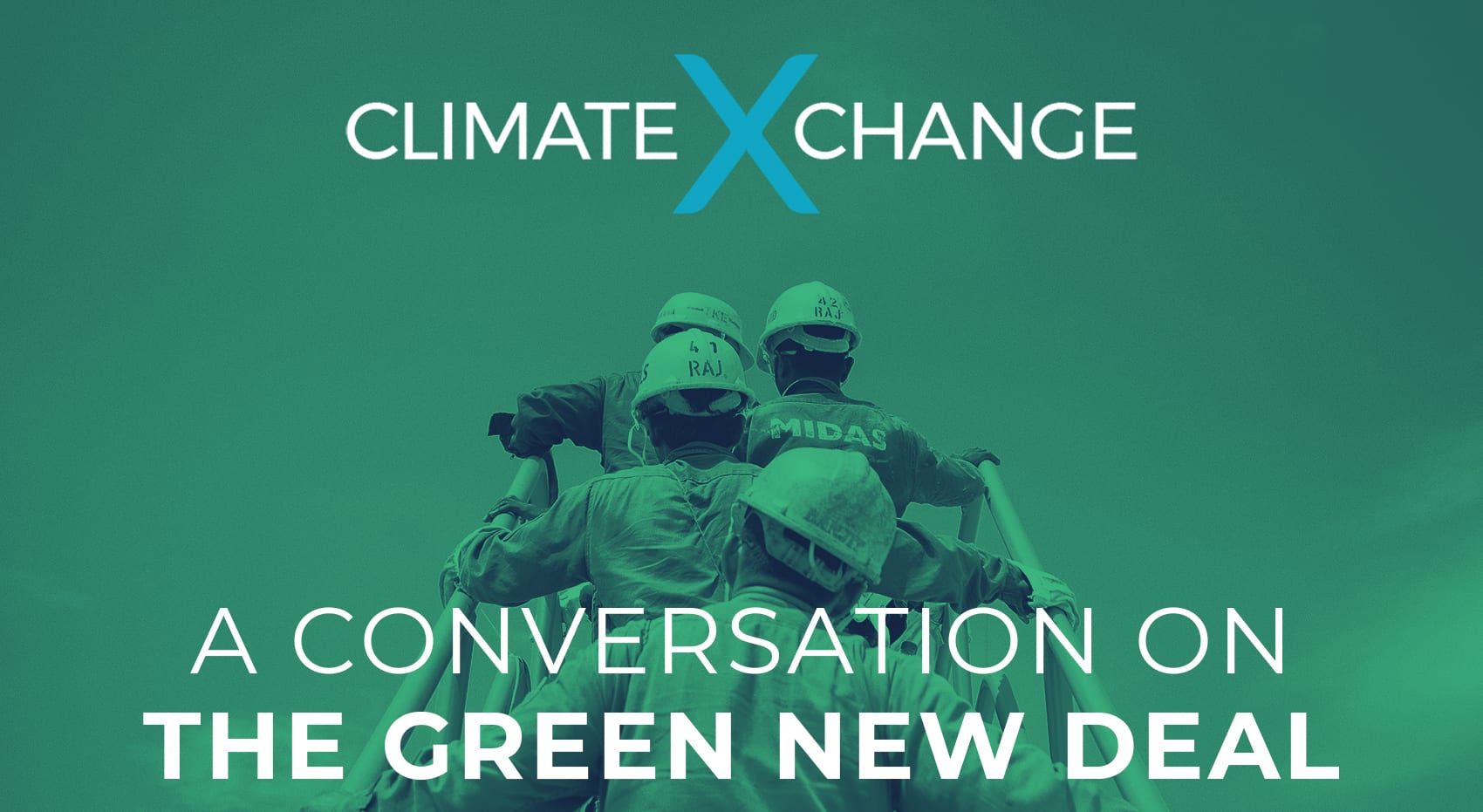Each month, the State Carbon Pricing Network (SCPN) holds a deep dive webinar, tackling a hot button carbon pricing issue with experts. This month, we led a conversation on the Green New Deal with Evan Weber, the political director and co-founder of the Sunrise Movement, and David Roberts, the renowned Vox climate writer well-known for his unprecedented ability to break down complicated environmental policy. The conversation was moderated by Climate XChange’s Executive Director, Michael Green.
You can listen to the full webinar here, or read our recap below:
But first- what exactly is the Green New Deal?
The Green New Deal is a non binding resolution that outlines a set of economic stimulus programs in the US that aim to address climate change through far reaching emissions reductions, and economic inequality. Inspired by the New Deal programs that lifted the US out of economic depression in the 1930s, the GND has been a central tenet of the Green Party platform for nearly a decade. It wasn’t until this fall, however, that the proposal took the national spotlight. Read David Robert’s explainer on the GND here.
Has the Green New Deal been proposed as legislation?
In the 116th Congress, the GND takes the form of a pair of resolutions (H. Res 109 /S. Res 59), sponsored by Rep. Alexandria Ocasio-Cortez (D-NY) and Sen. Ed Markey (D-MA). The resolutions calls for the creation of a GND, with the goals of:
- Achieving net-zero greenhouse gas emissions
- Establishing millions of high-wage jobs and ensuring economic security for all
- Investing in infrastructure and industry
- Securing clean air and water, climate and community resiliency, healthy food, access to nature, and a sustainable environment for all
- Promoting justice and equity
It’s important to note that the proposal is a resolution, not a bill proposing new law. Nevertheless, it is an early call for the US government to be as dedicated to addressing climate change as Franklin Delano Roosevelt was to stimulating the economy after the Great Depression.
How will these ambitious and transformative goals be achieved?
The resolution delineates that the goals will be achieved through a 10-year national mobilization effort that includes:
- Building smart power grids
- Investing in electric cars and high-speed rail systems
- Upgrading all existing buildings and constructing new buildings to achieve maximum energy and water efficiency
- Removing pollution and greenhouse gas emissions from the transportation and agricultural sectors
- Cleaning up existing hazardous waste and abandoned sites
- Ensuring businesspersons are free from unfair competition
- Providing higher education, high-quality health care, and affordable, safe and adequate housing for all
So, what did the experts have to say?
On the Movement:
Evan Weber:
- We’re a movement of thousands of young people around the country building an army to stop climate change and create millions of good jobs in the process.
- We worked really hard to elect candidates in states across the country and send a new generation of leaders to Congress. That’s another way to solve this problem — to actually elect new people.
- In November, we put the Green New Deal, a big, bold solution at the scale of the crises that our generation faces — climate change, inequality, and more — at the top of the national agenda. It has really been driving the conversation in Washington, and around the country, on climate change and climate action ever since.
David Roberts:
- I’ve been covering this area since the mid-2000s, and believe it or not, I used to come into work and think to myself, “Oh my god, what am I going to write about today? There’s just nothing happening, nothing to write about.” I never have that problem anymore.
On the Current GND Proposal:
Evan Weber:
- A new resolution was put forward by Alexandria Ocasio Cortez in the House and Senator Markey in the Senate. We hope it can be the starting point for what a GND is and needs to be.
- Lots of politicians have been hopping on board. We’ve got 12 Senators and 90 Representatives who are co-sponsors, and are getting more every day. A lot more young people are showing up at different offices across the country, pressuring their politicians, both Republican and Democrat, to act at the scale of this crisis.
On How the GND Has Captured National Attention:
Evan Weber:
- In October, right before the election, the IPCC put out this report on 1.5 degree Celsius (read CXC’s summary). Basically, what this report said is that in the next 12 years, we need to drastically transform every aspect of our society and economy at an unprecedented scale, and at an unprecedented speed, in order to avert the worst impacts of a ravaged world. That new report gave a lot of clarity to those of us who have been following the science of climate change for a while.
- It’s the first time a federal politician has looked squarely at the crisis of climate change, and said “this is what the problem actually is and here is what it is going to take to really solve it.” They [Cortez and Markey] put the problem and solution on a piece of paper in front of Congress, and said, “who is going to do what it really takes?”
- We were able to show that there’s a political story to be told. We have the Republican party at the national level that has been flat-out bought out by big oil, and we also have a Democratic party that has, so far, failed to do more than just give lip service to climate action and climate science. There’s a conflict between what the scientists and economists are telling us is needed, and the urgency that our politicians feel. That story has helped elevate the GND into the national spotlight.
David Roberts:
- This generation came of age during Obama, and all they’ve ever seen is Democrats trying to be reasonable and grown-up, and Republicans making fart noises, and nothing ever happening.
- Since 2010, politics have been, Democrats frantically trying to do something, anything, and Republicans shutting it all down. That’s the political baseline now. Young people are quite rightly sick of that, and don’t want to sit back and watch ten more years of it, especially in light of the science that is coming out and the character of the climate problem.
On the Intersection Between Climate Change and Inequality:
Evan Weber:
- It’s exciting to think about transforming our economy at scale, and all the good things that could provide to communities that have been left out of economic prosperity for decades, or even since this country’s founding, like indigenous communities and descendants of slavery.
- There is some text in the original resolution for the GND that said, “we recognize that tackling climate change at scale is a historic opportunity to virtually eliminate poverty in the United States.” That’s a much more exciting and compelling message to a vast majority of the public than ‘look out, the sky is falling, duck and cover’ or even something like ‘make polluters pay.’
On Influencing the Establishment:
Evan Weber:
- After the election, we had been hearing that Democrats had been planning to not make climate change a priority. We showed up in Washington DC at Nancy Pelosi’s office, and said, “Hey look, our generation just delivered Democrats to the House. We had the highest percentage of Millennials and Generation Z voting in history, and we were the largest voting block. It’s time for you to actually put forward solutions at a scale of this crisis and make a plan to deal with climate change.”
- We reached out to a fellow member of our generation who we helped elect, Alexandria Ocasio Cortez, to ask for support. She decided to show up at the sit-in that we were holding at Nancy Pelosi’s office, and put forward a draft resolution to create a select committee that would develop the actual legislation for how we are going to implement a GND. That committee itself was ultimately rejected by Nancy Pelosi and other members of Democratic leadership.
David Roberts:
- I tend to think that this sweet light of reason is unlikely to reach the older generation, who have had their political instincts, preconceptions, and founding myths formed.
- The best way to persuade them is to scare the crap out of them by putting one hundred kids in their office, to shock and frighten them. It really does work for them to bust out of their routine, and one hundred kids in their lobby is a break from their routine and that makes an impression. That’s the kind of thing that’s going to change the older generation, not another super convincing white paper.
On the Stark Generational Divide:
David Roberts:
- I just don’t think older people, especially older establishment Democrats, get climate change. They don’t get it. They don’t understand the essential nature of it. They think of it as an environmental problem, a pollution problem, just like the coal pollution problem before it, and the ozone layer, and refrigerants. They don’t get the urgency and they don’t get the fact that the damage is irreversible. They don’t get the fact that we have a short window of time in which we might have any effect on this thing at all, and we could lose that, and then it could be out of our control entirely. That’s not too far away.
- Young people get this urgency much more so, and are much more comfortable with the climate science. They understand that approaching this like a normal pollution problem, in the mode of normal politics (i.e whittling your goals and ambitions down until they can get the signature of the most right-most Senator in the Democratic caucus) just won’t solve the problem. We’re screwed if that’s the approach, so something different has got to happen. That’s definitional to me.
On Pushing the GND Forward:
Evan Weber:
- We need all hands on deck. We’re going to need everyone screaming out loudly for a GND and what it can mean for them and their communities.
- We’re working on building out different affinity groups and constituent groups for a GND: scientists for a GND, laborers for a GND, businesses for a GND, the Gulf South for a GND, farmers and ranchers for a GND, indigenous communities for a GND.
David Roberts:
- It doesn’t have a large chance, but that’s better than no chance. That’s what I don’t get about this pundit reaction so far. We’re spiralling down into horrors here. If this isn’t it, what’s your New Deal? What’s your solution? What can break us out of this if not this?
What’s Next? Upcoming Deep Dive Webinar
The Conservative Case for Carbon Pricing
When: April 2, 3pm EST
Register HERE
Fighting climate change is something that cannot be put on hold, even in an era of extreme partisan gridlock. Economists agree that carbon pricing is one of the most effective ways to reduce our greenhouse gas emissions, but as state campaigns for carbon pricing mobilize across the US, activists in conservative states have struggled to gain momentum. The question remains: how can we better engage people on all sides of the political spectrum?
Join us for a webinar on the best practices for bipartisan engagement on the issue of carbon pricing. Featured guests include Alex Bozmoski from RepublicEn, Nader Sobhani from Niskanen Center, and Josiah Neeley from R-Street Institute. All three represent right-leaning think tanks that support carbon pricing, and are eager to share their insight on bipartisan engagement with the carbon pricing community.










